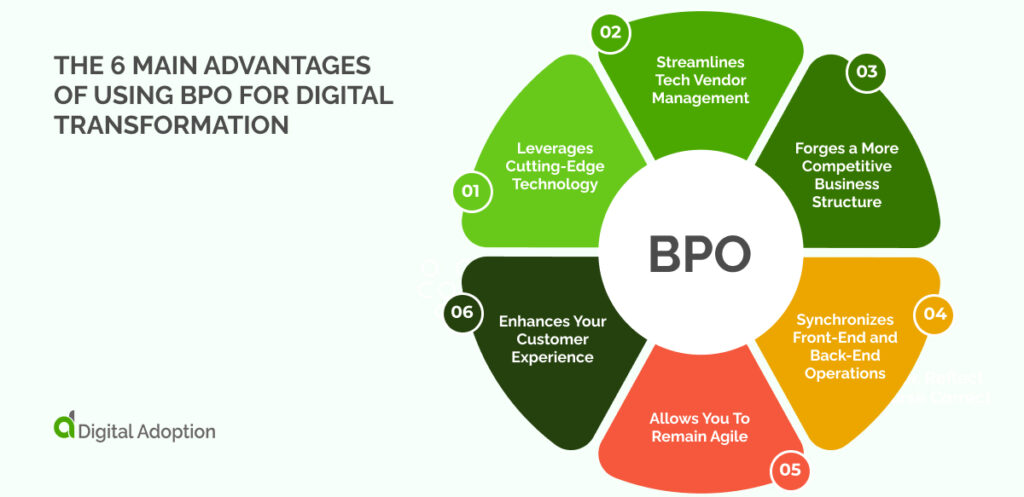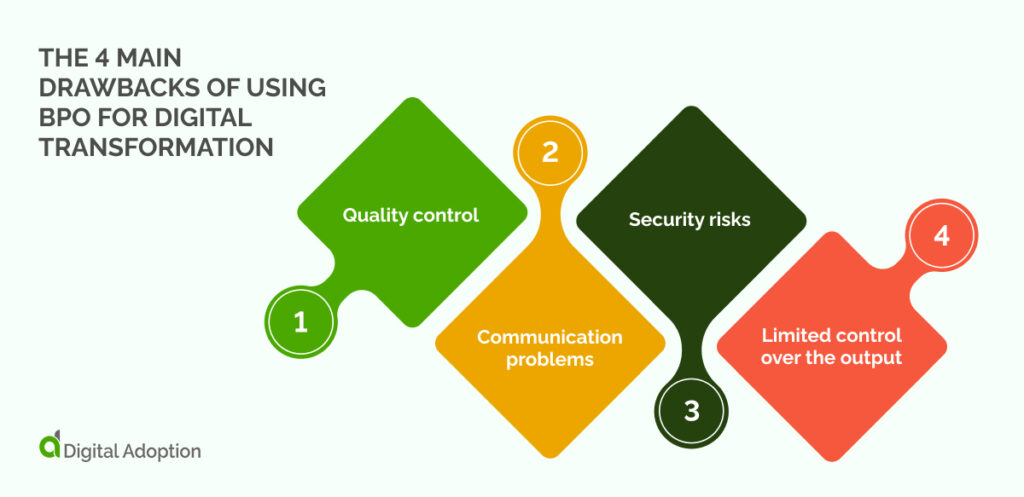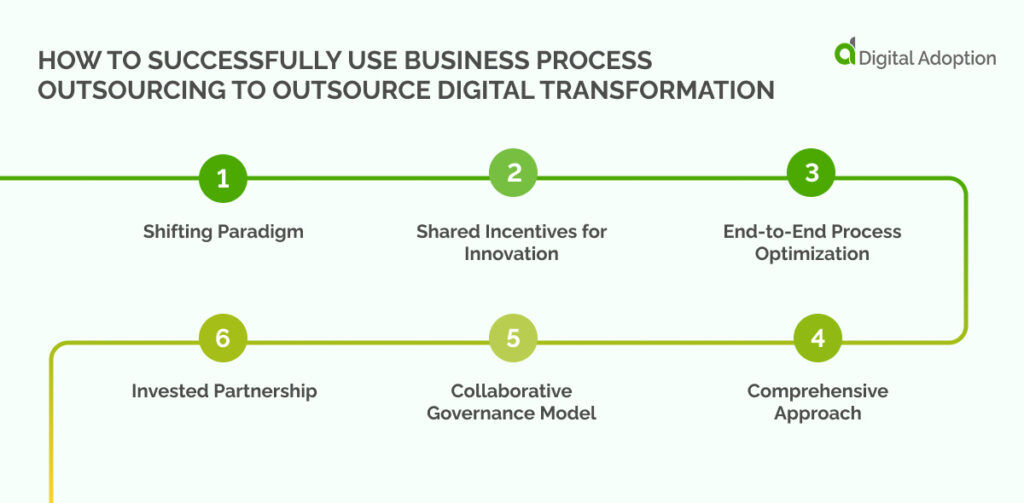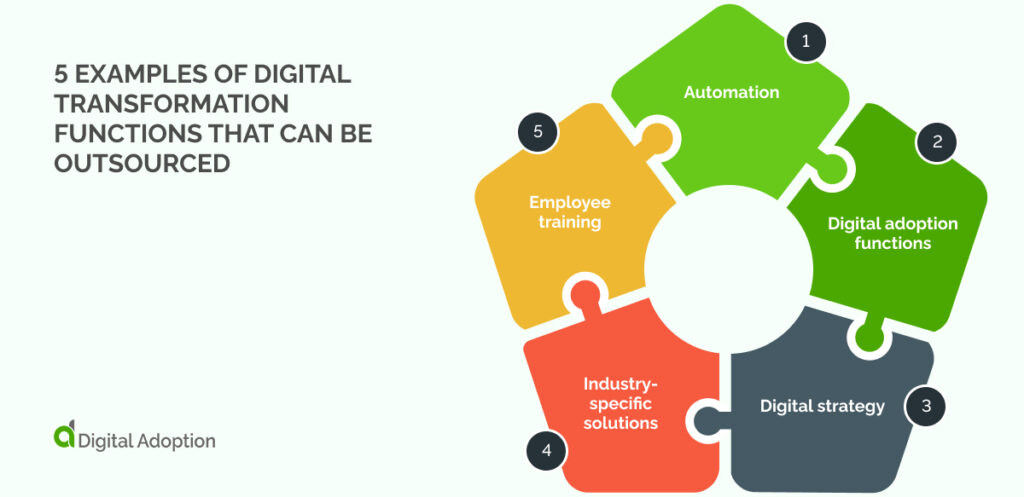Business Process Outsourcing (BPO) entails delegating diverse business operations, including support functions and client-facing tasks, to an external service provider.
Digital transformation represents the integration of digital technologies into all facets of a business, fundamentally reshaping business models, enhancing the efficiency of existing workflows, and offering better value to customers.
In a world reshaped by the pandemic, the impetus for digital transformation has intensified, with evolving business environments and the normalization of remote work necessitating an agile adoption of technological advancements.
For organizations navigating the complexities of digital transformation, BPO providers can serve as valuable allies. They alleviate the pressure associated with the rapid technological upscaling by handling a share of operational demands.
This partnership allows businesses to focus on refining their core functions and fostering growth, all while distributing the financial impact of fresh technological investments.
By the end of this guide, you will understand:
- What digital transformation and business process outsourcing (BPO) is
- BPO benefits and drawbacks in addressing digital adoption challenges
- How you can use BPO to implement digital transformation efforts
- Examples of digital transformation actions that can be outsourced
What is Digital Transformation?
Digital transformation is the strategic use of technology to revamp business processes, enhancing efficiency and competitiveness. Business process outsourcing (BPO) complements this by delegating specific functions to external experts, leveraging their specialized skills and resources.
Together, BPO and Digital Transformation empower organizations to adapt, innovate, and thrive in the digital era.
What Is Business Process Outsourcing (BPO)?
Business process outsourcing (BPO) refers to the strategic delegation of specific operational tasks to external service providers. These third-party firms manage these outsourced functions by adhering to predefined, measurable standards known as key performance indicators (KPIs).
How Is Digital Transformation and BPO Connected?
Digital transformation and business process outsourcing (BPO) are interconnected strategies that drive organizational efficiency and innovation.
Digital transformation involves leveraging technology to optimize internal processes, enhance customer experiences, and remain competitive in the digital landscape. BPO complements this by outsourcing specific business functions to specialized service providers, allowing organizations to focus on core competencies.
Through BPO, companies gain access to external expertise, streamlined operations, and cost efficiencies. The synergy between digital transformation and BPO lies in their collective ability to reshape business models, harness digital tools for operational excellence, and enable scalability.
Together, they empower enterprises to navigate complex technological landscapes, meet evolving market demands, and achieve sustainable growth in an increasingly digital-centric business environment.
What Are The Advantages Of Using Business Process Outsourcing For Digital Transformation?
In pursuing a digital overhaul, many businesses might enlist a BPO partner to delegate some or all of their operations, reaping benefits like streamlined vendor relations, sharpened competitive edge, and upgraded call center technologies. While outsourcing isn’t universally applicable, it can be instrumental during a digital shift.
Currently, BPOs might not be the obvious go-to for digital strategy enhancement for most businesses. Though not imperative, outsourcing can significantly streamline the transformation journey and enhance outcome quality.

Here are several compelling arguments for incorporating BPOs into your digital evolution for optimal impact:
Leverages Cutting-Edge Technology
BPOs often have innovative technologies that are not typically mainstream in other companies. Since BPOs manage a vast array of services globally, they must utilize the latest software, which you, as their client, can benefit from during your digital shift, including state-of-the-art productivity tools.
Moreover, BPOs are inclined to showcase their technological prowess during the partnership exploration phase. They list their tech capabilities in their portfolios, which strongly indicates their ability to meet your digital transformation requirements.
Streamlines Tech Vendor Management
As your company evolves digitally, managing various software vendors can become unwieldy. Though advantageous, constant updates and new features can lead to complexity and cost inflation. Managing too many tech vendors can derail your digital progress.
A BPO partnership can relieve the complexity of handling multiple vendor relations while you focus on core business tasks. Outsourcing certain operations like customer relationship management can lighten the load for your in-house teams and boost morale, ensuring your digital march proceeds with clarity and efficiency.
Forges a More Competitive Business Structure
Digital transformation is a cornerstone of remaining competitive. Adopting new technologies enhances your service and broadens your customer base. Employing a BPO to oversee certain marketing and sales operations can magnify your business footprint and establish your stature as a leading entity in your industry.
During periods of company expansion, a BPO can be a lifeline, balancing customer service capacity with demand. BPOs can help you deploy self-service automation and provide supplementary support during high-volume periods, ensuring you maintain customer service quality without excess staffing.
Synchronizes Front-End and Back-End Operations
The success of digital initiatives hinges on precision, and it’s easy to slip up. Many firms over-prioritize customer-facing activities and overlook core operations. Delegating back-office tasks to a BPO can foster your digital advancement, ensuring a robust platform for growth.
Core functions such as finance, HR, and procurement can be outsourced for deeper optimization. Firms that neglect back-office refinement may find their growth hindered by outdated internal processes. A BPO’s involvement ensures your digital metamorphosis keeps pace with your expansion, laying the groundwork for a scalable and enduring transformation.
Allows You To Remain Agile
Embracing digital transformation calls for nimble responsiveness and the capacity for rapid adaptation. Leveraging BPO services can be the ace up your sleeve, affording you the flexibility and scalability essential for today’s fast-paced business environment.
By entrusting peripheral tasks to BPO experts, you can concentrate on your core priorities, ensuring you remain at the forefront of your industry. BPO services enable you to easily navigate the twists and turns of the digital terrain, seamlessly adjusting to the evolving needs of consumers and the shifting dynamics of the marketplace.
Enhances Your Customer Experience
In the digital landscape, the customer experience is the ultimate monarch. BPO offers another digital transformation benefit by elevating customer engagements and morphing simple transactions into experiences that resonate and are remembered.
Harnessing the power of omnichannel support, smart chatbots, and analytics-backed intelligence, these services curate bespoke interactions that enchant your customers. Prepare to delight your clientele and forge enduring bonds that dazzle in the digital arena!
What Are The Drawbacks Of Using BPO For Digital Transformation?

Outsourcing is not a perfect solution to digital transformation challenges.
Drawbacks include:
- Quality control: Vetting is a necessary step when choosing vendors and providers. However, quality can still be an issue. This can be due, for example, to some of the other problems mentioned next.
- Communication problems: Because outsourced workers don’t work within an organization, communication can inherently be more difficult. Depending on the arrangement, communication time can also add to costs.
- Security risks: Every extra wheel adds a potential attack vector for cybercriminals. Outsourcing business solutions, therefore, can open up new security vulnerabilities.
- Limited control over the output: Outsourcing can undoubtedly streamline production, but there can be limitations to the type of services provided, levels of customization, and so forth.
When the benefits of outsourcing outweigh these disadvantages, outsourcing makes more sense.
How To Successfully Use Business Process Outsourcing To Outsource Digital Transformation

To fully harness the potential of business outsourcing in digital transformation, it’s essential to adopt best practices that pivot from traditional outsourcing models to digitally focused ones.
Gone are the days when outsourcing simply meant offloading routine tasks for incremental savings. Now, the paradigm has shifted towards leveraging outsourcing as a vehicle for radical digitalization, where service providers take on complex operations and are reimbursed based on outcomes and their deployment of advanced technologies like natural-language processing, robotic process automation, or artificial intelligence.
The dynamic intersection of digital transformation and business process outsourcing requires a strategic shift—where outsourcing becomes a conduit for radical digitalization, fostering innovation, comprehensive process optimization, and a collaborative partnership that transcends traditional engagements.
Let’s explore:
1. Shifting Paradigm: Adopting best practices that pivot from traditional outsourcing models to digitally focused ones is essential to harness the potential of business outsourcing in digital transformation. The paradigm has shifted towards leveraging outsourcing as a vehicle for radical digitalization, with service providers taking on complex operations reimbursed based on outcomes and the deployment of advanced technologies.
2. Shared Incentives for Innovation: In this new landscape, creating shared incentives that promote innovation throughout the contract is beneficial. Deals structured around shared benefits, such as gain sharing, can motivate service providers to continuously innovate, aligning their efforts with the company’s overarching goals.
3. End-to-End Process Optimization: Regarding digital transformation, it is crucial to rethink and redesign digital processes comprehensively. Maximum impact is observed when providers are entrusted with the entire end-to-end process, allowing them to optimize, digitize, and streamline by eliminating manual redundancies.
4. Comprehensive Approach: A service provider responsible for invoice automation might encounter initial challenges due to varying formats. They may suggest standardized changes upstream in the submission process, fostering a culture of continuous improvement over time.
5. Collaborative Governance Model: A successful digital transformation requires a new level of partnership and shared responsibility. Modern digital outsourcing necessitates a collaborative governance model where both the company and the service provider actively participate and oversee various performance metrics, including those related to customer experience.
6. Invested Partnership: Providers should be granted autonomy in decision-making and work closely with their clients, especially in critical areas such as technology integration and data security. This ensures that both groups are equally invested in the digital transformation journey and its successful adoption.
Examples Of Digital Transformation Functions That Can Be Outsourced

The digital ecosystem has exploded in recent years.
Countless business functions are being transformed, from business models to processes to technology infrastructure.
Below are some examples of digital transformation functions that are commonly outsourced:
- Automation: Automations, such as robotic process automation (RPA), can significantly increase efficiency, reduce process costs, and decrease production timelines.
- Culture: Cultural transformation is a crucial part of digital transformation – to succeed, companies must become more innovative and digital-friendly, for example.
- Digital strategy: Every business must have a digital strategy in today’s digital economy. They should also develop strategies such as a digital adoption strategy and a digital transformation strategy.
- Industry-specific solutions: Some digital transformation service providers offer solutions specific to a specific market, such as healthcare, supply chain management, aerospace, etc.
- Consulting: Consultants can guide businesses and offer training, support, coaching, and on-demand expertise. This approach allows organizations to develop internal functions without relying too heavily on outsourced support.
- Security: Cybersecurity is an absolute must in the digital ecosystem. Specific security solutions absolutely must be outsourced – after all, only specialists can keep up with the fast-paced world of cybersecurity.
- Digital adoption functions: Digital adoption is fundamental to every digital transformation process. Every business must adopt new technologies, implement new software, onboard and train employees, etc.
- Change management: Adjusting to organizational and cultural shifts is more intricate than implementing technological updates. Therefore, it is prudent for many companies to consider securing support specialized in managing change.
- Employee training: Digital adoption platforms, for instance, offer an employee training solution that simplifies software adoption, increases productivity, cuts costs, and more.
What’s Next For Digital Transformation And Business Process Outsourcing
In the current business landscape, the concept of Business Process Outsourcing (BPO) has evolved significantly, garnering fresh relevance as a strategic enabler of digital transformation.
In an era where businesses aim to sharpen their focus on primary capabilities and enhance operational efficiency, BPO emerges as a pivotal tactic to facilitate this digital evolution.
Since in-house IT departments may sometimes be overextended or not fully equipped to undertake expansive digital transformation initiatives, many companies are turning to external BPO partners.
These partners bring not just the benefit of specialization but also the advantage of cutting-edge technological expertise and a reservoir of talent adept at navigating the complexities of digital change.
The synergy of internal resources with the specialized services offered by BPO providers presents a formidable approach to bridging technological gaps.
It’s a strategic collaboration that aligns a company with the trajectory of innovation and progress, positioning it firmly on the road to digital prowess and competitive advantage.













